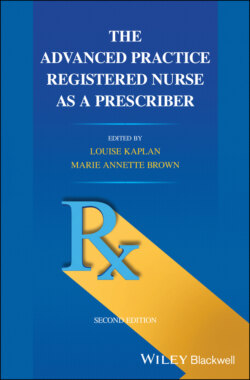Читать книгу The Advanced Practice Registered Nurse as a Prescriber - Группа авторов - Страница 26
Box 2.1 Strategies for improving rational prescribing
ОглавлениеResist prescribing for minor, self‐limiting, or non‐specific symptoms.
Avoid influences that can cloud rational decision making.
Do not accept gifts that even have the appearance of affecting your decision making.
Balance information received from the pharmaceutical industry with objective, unbiased sources.
Encourage patients to seek out non‐biased sources of information.
Use evidence‐based guidelines and electronic or current print references to assist in prescribing.
Review patient medications during each visit.
Emphasize lifestyle changes and always teach non‐pharmacological management.
Simplify and discontinue medications whenever possible.
Avoid empirical treatment.
Reduce the number of pharmacies and providers whenever possible.
Titrate medication slowly.
Monitor non‐prescription drugs and treatments.
Sources: Farrell et al., 2003; Fick et al., 2003; Fulton & Allen, 2005; McVeigh, 2001.
Only the United States and New Zealand have direct‐to‐consumer advertisement about medications with both positive and negative effects on patients (Filipova, 2019). Advertisements inform people about medications and symptoms related to certain disorders, promote information seeking, increase use of appropriate drugs when underuse is present, and improve the patient’s perception of their interactions with providers. Advertisements may also influence consumers to request unnecessary or inappropriate medications or interfere with medication adherence, all of which makes rational prescribing more difficult (DeFrank et al., 2019). APRNs, through education and counseling, can help patients understand these external influences and make an appropriate decision that reflects rational treatment choices.
Shared decision making should include a discussion of whether the use of medication is physically and financially sustainable, the accessibility of the treatment, and the ease of use. Patients should be informed of the most common and serious side effects as well as key monitoring tests that contribute to patient safety. For example, a psychiatric NP will need to monitor levels of lithium at periodic levels to avoid toxicity. Many patients have conducted considerable Internet research prior to their visit which prompts medication questions or issues. Through education, a patient is provided with relevant facts to make a decision about whether to take a medication. Consent is typically verbal, but there may be situations in which written consent is obtained such as when prescribing a medication “off label,” i.e. when a medication is prescribed for a reason not approved by the Food and Drug Administration (FDA).
The APRN should work collaboratively with pharmacists who are experts in their field to educate patients about their medications. Patients may read information about medications and become fearful of the potential side effects and thus do not fill the prescription or do not take the medicine once obtained from the pharmacy. This requires a balance between providing too much and providing too little information about medications. At a minimum, patients should be sufficiently informed to understand the action of a drug, the dosage, and the most common and severe adverse reactions. They also need to be informed about how to handle common problems, missing a dose, follow‐up if the drug is not effective, and under what conditions the medication can be discontinued.
It is also important to provide guidance about how long the patient should expect to take the medication, particularly for non‐communicable conditions. A guiding principle of prescribing is to use the lowest dose for the shortest period of time possible. An ideal medication is one that is effective with minimal or no side effects and is low cost. Sometimes the patient’s health issue resolves. Lifestyle modifications such as exercise and sodium reduction may result in lowered blood pressure. In other instances a person may need antihypertensive medication despite these modifications.
